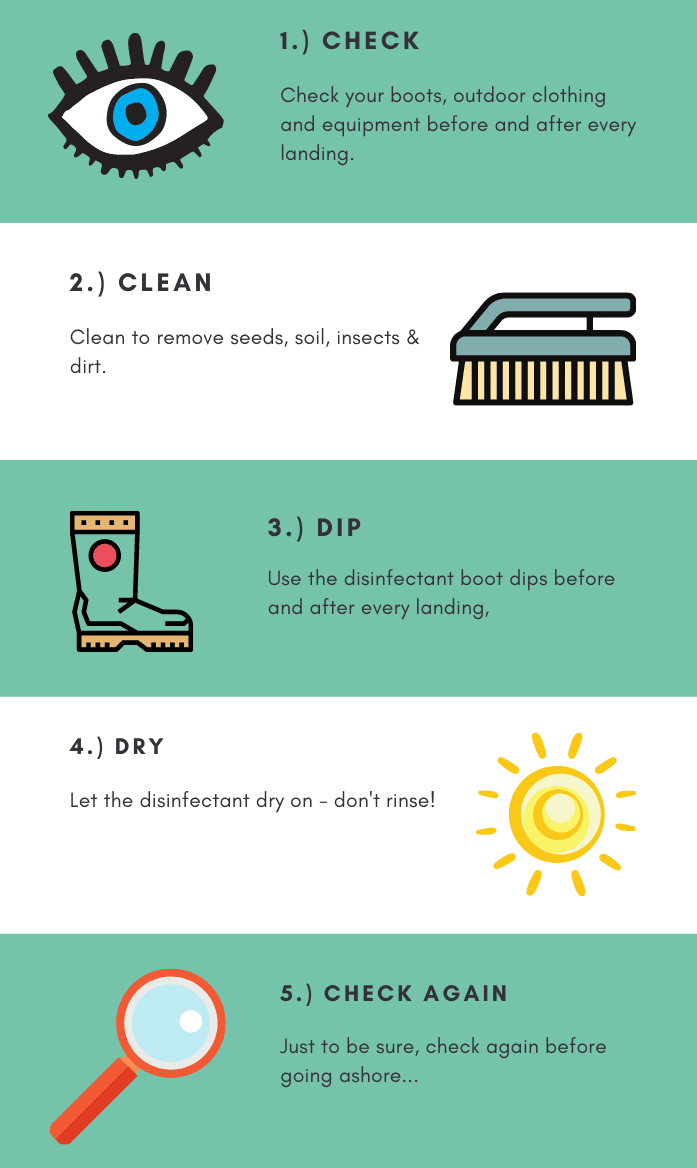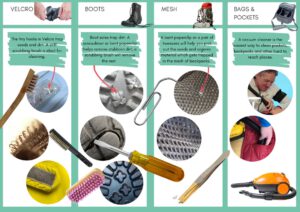Biosecurity – Help Protect South Georgia
After habitat restoration projects to remove invasive species such as reindeer, rats, mice and weeds, South Georgia is one of the most pristine environments in the world. Practicing thorough biosecurity is the single most important thing you can do to protect South Georgia.
Our Biosecurity Handbook is the one-stop-shop for all of our biosecurity policy & procedures.
Highly Pathogenic Avian Influenza
Avian influenza is a viral disease that primarily affects birds. Low pathogenic avian influenza viruses are common in wild birds and often cause no signs of disease. However, some strains of the virus including H5 and H7 are highly pathogenic in domestic poultry and can cause high mortality if they escape into wild bird populations. These are known as highly pathogenic avian influenza (HPAI). Further H5 and H7 HPAI can emerge from low pathogenicity versions following replication in some species although the low to high pathogenicity switch is predominantly thought to occur in poultry.
The current outbreak of H5N1 HPAI began in 2022 and has resulted in the death of high numbers of seabirds in the Northern Hemisphere, the south of Africa and around the Atlantic and Pacific Oceans and throughout South America. Whilst predominantly still a virus that affects birds, during the current outbreak some mammals have been infected. Often this is due to predators and scavengers consuming infected birds or carcasses, but cases have also been noted in some marine mammals where this mode of transmission would not apply. The hypotheses for the infection of such marine mammals includes environmental exposure or behaviours that may enable exposure within the aquatic environment (e.g., ‘playing’ with infected carcasses).
In October 2023 HPAI was confirmed in brown skua on Bird Island, South Georgia and since then has been detected at numerous other sites around the Territory and in a range of species including elephant seals, fur seals, wandering albatross, gentoo penguins and king penguins.
As the 2024/25 season approaches GSGSSI continues to monitor the situation in partnership with the British Antarctic Survey (BAS), Animal and Plant Health Agency (APHA) and the International Association of Antarctica Tour Operators (IAATO). In the 2024/25 season we are moving from site based to activity based response measures. Updated guidance on HPAI risk and response in the Territory is available in Section 9 of the Biosecurity Handbook.
Enhanced biosecurity procedures remain key to all response measures. All visitors and staff are required to maintain strict separation from wildlife and apply extra caution when cleaning clothing and equipment that has been used in other wildlife areas where HPAI has been confirmed or suspected. In addition, GSGSSI requires that an expert guide or researcher familiar with bird behaviour performs an assessment prior to each landing and remains vigilant for signs of the disease. Visitors must not kneel, crouch, lie or sit on the ground and must remain at least 5m from wildlife and carcasses. If it is not possible to meet these conditions, landings will be aborted.
Visiting South Georgia? Read On…
Non-native species can spread to South Georgia, or move between different parts of South Georgia as a result of our activities. Seeds, microorganisms, and even insects can hitchhike on footwear, attached to clothing, or in bags that have been used in the outdoors previously. By following a few simple steps, you can help prevent this.
Before Leaving Home
Ideally, it’s best to buy new outdoor clothing and equipment for your trip to South Georgia. This ensures it’s perfectly clean from seeds, soil and insects. Choose equipment which is easy to clean and biosecure. Where possible avoid:
- Velcro. It holds on to seeds and dirt and is really hard to clean.
- Mesh. Some backpacks have breathable mesh back liners, mesh water bottle holders, and mesh is sometimes used in a breathable layer in waterproof trousers. Seeds get stuck in the mesh and they are really hard to remove.
- Narrow boot treads. The more ‘open’ the treads on the soles of your boots the less likely they are to become clogged with soil and dirt, and the easier they are to clean.
If you already have outdoor clothing and equipment you’d like to bring, examine and clean clothes, footwear, and bags thoroughly. Examine and clean all clothing, including pockets, seams, Velcro fasteners, and footwear soles for dirt and organic material. Use a vacuum cleaner, brushes, and water where necessary to ensure all seeds and dirt have been removed.
Before and After Every Landing
It’s important to repeat the biosecurity checks and cleaning before and after every shore landing. This ensures that you don’t accidentally spread invasive species and wildlife diseases between sites, and helps make your visit truly sustainable.



